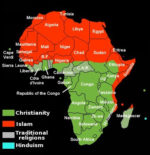By: Chip Stapleton on June 16, 2017
I read our assigned reading for this week, Christianity and African Traditions by Matthew Michael, with quite a bit of interest. The church I currently serve is about 50% Cameroonian, and as such, I often – on a weekly, sometimes even daily basis – see and try to account for and understand the intersection of our…
By: Geoff Lee on June 16, 2017
Following on from our earlier considerations of contextual theology and folk theology, this book looks at how to marry classic Christian theology in the Judeo-Christian tradition with specific African traditions and culture. Dr. Matthew Michael carries out a sweeping review of various systematic theological categories and considers how they fit in with and can be…
By: Kristin Hamilton on June 16, 2017
Whenever I read a book that analyzes another culture, especially one written by someone who has personal knowledge and understanding of that culture as well as a research knowledge, I know I am at a disadvantage from the start. Such is the case with Christian Theology and African Traditions by Matthew Michael. As Michael works…
By: Christal Jenkins Tanks on June 15, 2017
“Christianity has “a prefabricated theology, a book theology . . . what she reads in books written by European theologians. . .” and “what she is told by Europeans is accepted uncritically and given out undigested in preaching or teaching.”Similarly, the theological discourse of those times is characterized by unhealthy reactionary to Western misrepresentations of…
By: Stu Cocanougher on June 15, 2017
 When we think of traditional missions, we think of missionaries trekking jungles, mountains, and deserts in search of tribal people who have never heard the name of Jesus. Alternately, we may think of missionaries who share the good news with Muslims, Hindus, Buddhists, or Communists. Yet, there are some areas in today’s…
When we think of traditional missions, we think of missionaries trekking jungles, mountains, and deserts in search of tribal people who have never heard the name of Jesus. Alternately, we may think of missionaries who share the good news with Muslims, Hindus, Buddhists, or Communists. Yet, there are some areas in today’s…
By: Lynda Gittens on June 15, 2017
Christology Theology and African Tradition Christian Theology: Synonymous with the African individuals Must connect with human setting to stay important Isolate humankind detaches God Be theocentric and in addition human-centric Must connect with the perspectives of the African individuals (convictions, values and customary introductions) Be loyal to the Scriptures no reverberate of contemporary ideological ramblings…
By: Jennifer Dean-Hill on June 15, 2017
Throughout the pages of Matthew Michael’s book, “Christian Theology and African Traditions”, I was reminded of the many discussions of contextual theology and the words of Paul: “I have become all things to all people so that by all possible means I might save some” (I Cor. 9:22). What a beautiful reminder of our responsibility in…
By: Jim Sabella on June 15, 2017
In recent weeks the members of our cohort have read two books about Africa’s influence on Christianity. In the first book, Oden argues for Africa’s role in shaping present Christian thought. In this week’s reading Michael argues for an African theology that not only has the potential to inform the African church but also the…
By: Mary Walker on June 14, 2017
“The contention of this work is that Christian theology should encourage taking on the positive elements of the African traditions and positioning these elements in dialogue with the teaching of the scriptures.”[1] In his book, Christian Theology & African Traditions, Matthew Michael seeks to transform the African mind and its worldview and traditions to be…
By: Katy Drage Lines on June 11, 2017
When Kip and I moved to Kenya to work among the Turkana, we spent our first 12 months living in the remote village of Kangarisae, learning the language and culture of Turkana. It was in that little village where we first built relationships—with our language helper, the church leaders, and the elders—men and women—in the…
By: Stu Cocanougher on June 9, 2017
 This September I will travel to Cape Town, South Africa for the second of three “on location” intensives with Portland Seminary. In preparation for this, I have been asked to read the book The Rise and Fall of Apartheid by David Welsh.1 This book is highly detailed, as it should be. The historical foundations for…
This September I will travel to Cape Town, South Africa for the second of three “on location” intensives with Portland Seminary. In preparation for this, I have been asked to read the book The Rise and Fall of Apartheid by David Welsh.1 This book is highly detailed, as it should be. The historical foundations for…
By: Chip Stapleton on June 9, 2017
You probably familiar with the saying, ‘love means never having to say you’re sorry’. That phrase has never made any sense to me, and more than that, as I have grown up and learned more and experienced more of both loving and being loved, it has occurred to me that the exact opposite is closer…
By: Kristin Hamilton on June 9, 2017
I have been watching The Handmaid’s Tale, a television series with a modern take on the 1985 dystopian novel of the same name by Margaret Atwood. I read the original book some time ago, and this current series is equally as chilling if not more so. The bottom line question is this: How far will…
By: Christal Jenkins Tanks on June 8, 2017
“For to be free is not merely to cast off one’s chains, but to live in a way that respects and enhances the freedom of others.”[1] – Nelson Mandela In 1988, I remember sitting with my parents as we watched a concert with celebrities and singers such as Whoopi Goldberg, Whitney Houston, Tracy Chapman, Stevie…
By: Jennifer Dean-Hill on June 8, 2017
Unity makes or breaks a country… In summary of the recent read, “The Rise and Fall of Apartheid”, it appears that unity was the secret ingredient for the rise and fall of the South Africa apartheid. The lack of unity of Africans set a stage for an apartheid to take hold, in the same way,…
By: Katy Drage Lines on June 8, 2017
David Welsh’s extensive treatise on South Africa’s experiment with social engineering (aka ‘apartheid’) is an excellent introduction for those who are not South African. For those of us visiting South Africa later this year as part of our doctoral research, it is essential reading to understand the South African context. Even for me, as a…
By: Lynda Gittens on June 7, 2017
You hypocrite, first take the plank out of your own eye, and then you will see clearly to remove the speck from your brother’s eye. Matthew 7:5 (NIV) THE RISE AND FALL OF APARTHEID BY WELSH In 1948, Apartheid was for the people with black skins, white Afrikaans, Coloured, and Indians. It, for the most…
By: Geoff Lee on June 7, 2017
Those of us of a certain age have lived through some amazing historical events in recent decades. I was living in Germany when the wall came down and East and West Germany were reunited in what was a relatively peaceful process. I was living back in the UK when the Northern Ireland Peace Agreement came…
By: Jim Sabella on June 7, 2017
Summary: It seems like a simple enough word, apartheid: apartness; but the story of Apartheid is one of unbelievable pain and one of unbridled abuse of power. It is a story of a people who became the target of an insidious and legal effort to pretend that they did not exist by enacting draconian segregation…
By: Mary Walker on June 7, 2017
“A miracle? A negotiated revolution? A ‘refolution’? All of the above can be, and have been, used to describe South Africa’s transition from being the world’s last surviving racial oligarchy to a democratic order. The theme of this book has been that the transition occurred because the principal antagonists, the ANC and the NP,…
 When we think of traditional missions, we think of missionaries trekking jungles, mountains, and deserts in search of tribal people who have never heard the name of Jesus. Alternately, we may think of missionaries who share the good news with Muslims, Hindus, Buddhists, or Communists. Yet, there are some areas in today’s…
When we think of traditional missions, we think of missionaries trekking jungles, mountains, and deserts in search of tribal people who have never heard the name of Jesus. Alternately, we may think of missionaries who share the good news with Muslims, Hindus, Buddhists, or Communists. Yet, there are some areas in today’s…
 This September I will travel to Cape Town, South Africa for the second of three “on location” intensives with Portland Seminary. In preparation for this, I have been asked to read the book The Rise and Fall of Apartheid by David Welsh.1 This book is highly detailed, as it should be. The historical foundations for…
This September I will travel to Cape Town, South Africa for the second of three “on location” intensives with Portland Seminary. In preparation for this, I have been asked to read the book The Rise and Fall of Apartheid by David Welsh.1 This book is highly detailed, as it should be. The historical foundations for…